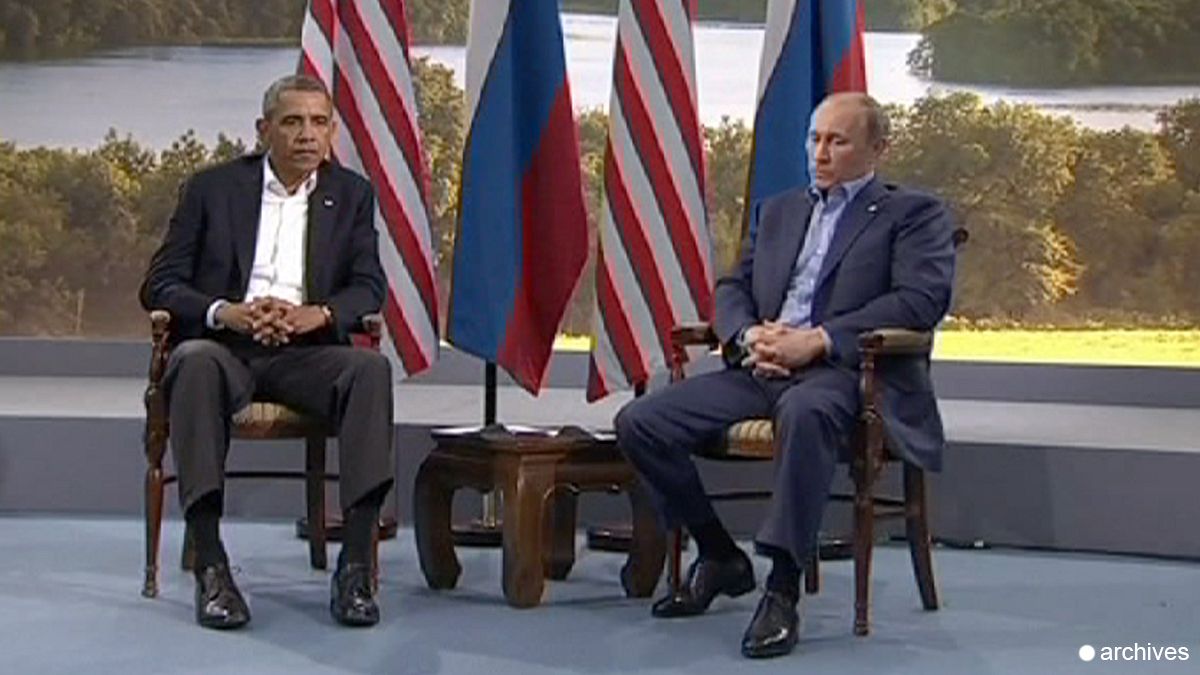Saint Petersburg, venue for the latest summit of the G20. Although it’s slightly calmer five years after the group’s creation in the wake of the 2008 global financial upheaval, the economic and job-creation workload is just as full; but now there’s also the Syria crisis to consider. This continues to drive a wedge between the US and Russia, Moscow being the Damascus regime’s most formidable ally, with veto power in the UN Security Council.
The Snowden affair has also chafed relations between Presidents Vladimir Putin and Barack Obama; Washington cancelled a pre-G20 bilateral summit with the Russians. Last week Putin brushed that off, saying it wasn’t a disaster, and he denied any suggestions of personal animosity towards Obama.
Putin said: “President Obama wasn’t elected by the American people to be nice to Russia. And your humble servant wasn’t elected by the people of Russia to be pleasant to anyone. We work, we argue about some things. We are human, sometimes one of us gets his back up. But let me reiterate that global mutual interests form a good basis for searching for joint decisions.”
Syria hung heavily over last June’s G8 summit in Northern Ireland. The support brought to the Syrian regime by Islamic militant group Hezbollah prompted Washington to speak openly about providing military backing for the rebels. Obama and Putin came out of one-on-one talks to face the international media not hiding their discord.
Obama was well into his second term by then, and yet he began his first – with Bush gone – wanting to ‘reset’ relations with Moscow. Facing challenges, both sides’ top diplomats made light of misunderstandings.
Indicating a prop she had presented to her counterpart Sergei Lavrov – a big, red industrial-like control button, inscribed with lettering – Hillary Clinton said: “We worked hard to get the right Russian word. Do you think we got it?”
The Russian Foreign Minister said: “You got it wrong. It should be ‘peresagrouska’ (reset); this says ‘peregrouska’ which means ‘overcharged.’”
Our Russian service presenter asked a political journalist in Moscow for his opinion.
Andrei Belkevich, euronews: “The Saint Petersburg G20 meeting should have come after a Russia-US summit in Moscow. Barack Obama had been expected for discussions on global security problems with Vladimir Putin, the new Middle East crisis and other sensitive subjects. But the US president called off his visit, after the Russian authorities granted asylum to Edward Snowden, the former subcontractor with the American secret services. We have the editor-in-chief of the magazine Russia in Global Affairs, Fiodor Loukianov, to speak about Russia-US relations today.”
euronews: “Most analysts agree that it wasn’t the Snowden case that was the cause for the cancellation or for a new cold wave between Moscow and Washington, but was the pretext. What’s the real cause?”
Fiodor Loukianov: “If the Snowden thing hadn’t come up, Obama would have come, but the main problem would have been raised anyway: that is that serious matters are off the table for Putin and Obama. Certainly, there are problems, there are crises, for example the crisis in the Middle East. But that’s political routine, even though these crises are important and intense. The questions that always used to be broached under international relations, however, strategic subjects such as offensive weapons reduction, are no longer discussed, because Russia doesn’t want to talk about them. Russia is satisfied with the way things are at the moment. Discussions about democracy and human rights, that were equally the order of the day in Soviet times today are spoken about in vain, because the positions are so radically different. That’s why the whole programme is worn out.”
euronews: “You’re saying the common programme between Russia and the United States is no more, and that probably is not about to change in the near future. Is that perhaps not such a bad thing? Relations could be built without too much drama, free of passion, not too offensively, so routine problems can be solved step by step?”
Loukianov: “We could do that if the whole world was calm, predictable and controllable. In that case, we could take a break and address technical questions serenely and wait for a good time for a new conversation on the background problems. But we live in a world where there’s something happening nearly every day, something that transforms our global conceptions. What seemed obvious yesterday seems wrong for us today. In a situation like that, Moscow and Washington putting things on hold, unfortunately, would not be possible. For example, we can see that very clearly in the Middle East at the moment.”
euronews: “At the G20 summit in Saint Petersburg, is it going to be possible to take the reciprocal reproaches down a notch between Moscow and Washington? Or, on the contrary, is this going to get worse?”
Loukianov: “I don’t think there’s any way in Saint Petersburg that the main Russian-American problem can be avoided. And that has nothing to do with the intensity of these reproaches. We are seeing a gradual but very stable alienation set in between Russia and the US: two opponents facing each other on their sides of the boxing ring, who don’t want to fight. They don’t even consider that fighting or conversation are necessary. I’m afraid that’s not going to change in Saint Petersburg or in the near future. What we’re hearing more and more in Russia is this point of view: that the US takes minor, local problems that can be dealt with at a regional level and turns them into global problems, to force the whole world to take them into account.”
